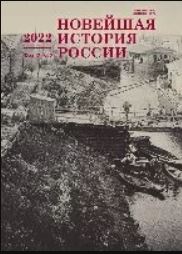Положение религиозных общин Западной Сибири в контексте государственно-конфессиональной политики середины 1950-х - первой половины 1960-х гг.
The Situation of Religious Communities in Western Siberia in the Context of the State Confessional Policy in the Mid-1950s - Early 1960s
Author(s): Peter Konstantinovich Dashkovskiy, Natalia Petrovna ZibertSubject(s): Sociology, Post-War period (1950 - 1989), Sociology of Religion, History of Religion
Published by: Издательство Исторического факультета СПбГУ
Keywords: confessional policy; atheism; anti-religious propaganda; religion; Western Siberia; USSR;
Summary/Abstract: State resolutions issued during the period under review were aimed at strengthening scientific and atheistic propaganda and eradicating religion in society, as a result of which religious communities trying to obtain registration faced hidden opposition from the authorities. At the same time, registered communities were forced to account for numerous regulations of the state authorities. Otherwise, they could lose their state registration and cease their activities. This situation provoked the emergence of a large number of unregistered religious groups, and on the other, strengthened the position of registered associations due to the constant influx of new believers into them. Special attention is paid to the study of the situation of religious communities in Western Siberia in the late 1950s — early 1960s, when a new wave of church closures took place within the framework of the anti-religious campaign of N.S.Khrushchev. During this period, not only clergymen, but also ordinary parishioners came under the special control of state authorities. In addition, the activities of the so-called “forbidden sects” were completely banned, the list of which was defined in the instructions for the application of legislation on cults, published in 1961. In addition, in order to reduce the role of religion in Soviet society, resolutions were issued that negatively affected the economic situation of churches. The study concluded that the administrative pressure exerted by the authorities on religious associations, the introduction of a system of registration of persons who attend church, and the repressive methods of work of state regulatory bodies, not only provoked the growth of illegally operating religious groups, but also increased the number of people hiding their religious beliefs.
Journal: Новейшая история России
- Issue Year: 12/2022
- Issue No: 39
- Page Range: 477-490
- Page Count: 14
- Language: Russian

